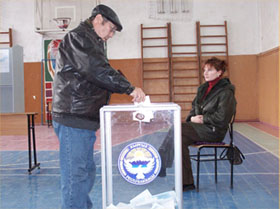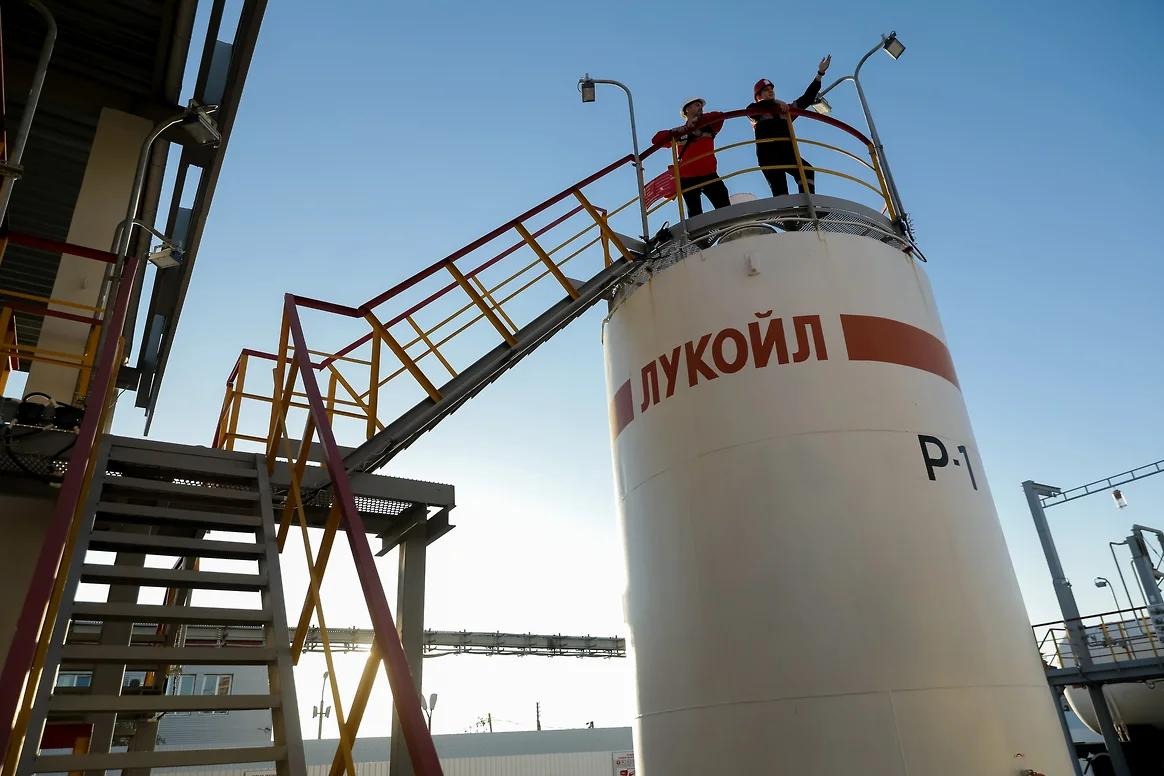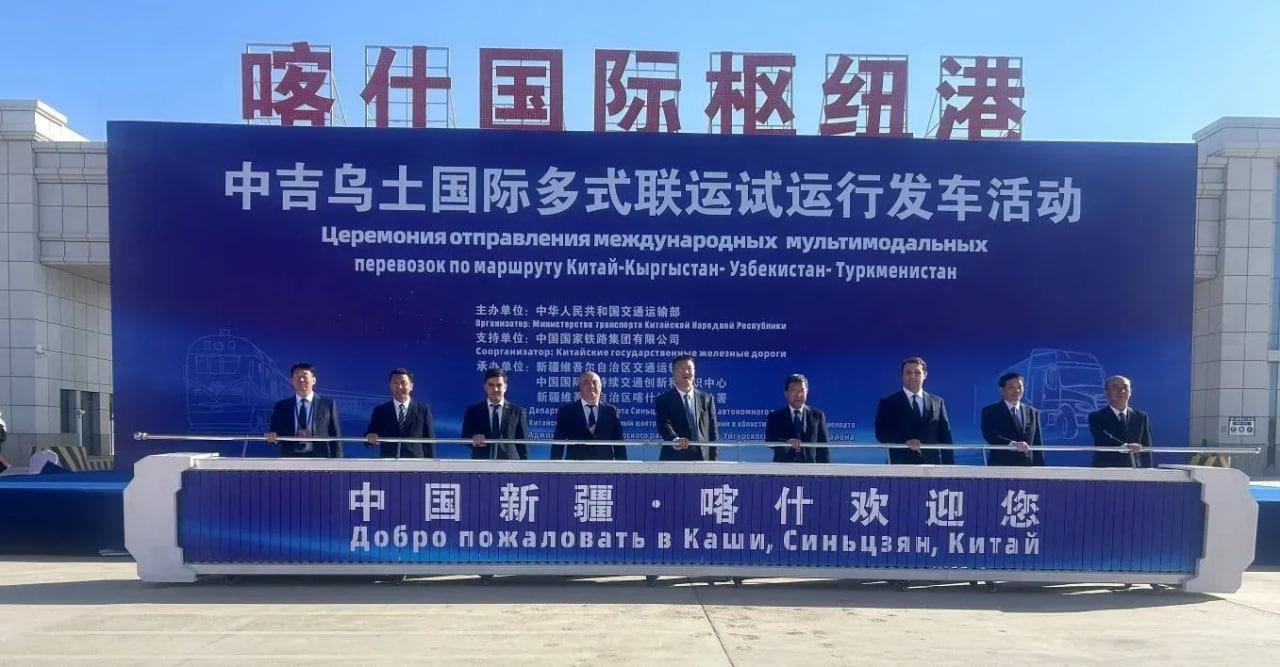
PROTESTS RISE FOLLOWING DISPUTED KYRGYZ VOTE
PROTESTS RISE FOLLOWING DISPUTED KYRGYZ VOTE
Kyrgyzstan held parliamentary elections on Sunday, February 27. Some 388 candidates vied for 75 parliamentary seats. According to preliminary data collected by the Central Electoral Commission, candidates secured a first-round victory in 32 districts, while the other 43 seats will be determined in a runoff on March 13. The pro-governmental Party of Unity and Development, “Alga Kyrgyzstan!” bested its rivals in 22 out of the 75 regions. The party fielded a total of 25 candidates. In eight electoral districts they collected more than half of votes, which automatically gives them legislative seats.
Preliminary results show that two of President Askar Akayev’s four children appear poised to become MPs. The oldest son, Aidar, collected almost 80% of votes cast in Kemin electoral district, which means that he will not have to participate in the second round of elections. Daughter Bermet ran in Bishkek University electoral district number 1.
The election was declared invalid in the Kochkor electoral district of Naryn oblast (northern Kyrgyzstan) because the highest vote getter on the ballot was “against all.” According to the election code, new candidates must be nominated for the subsequent elections because candidates rejected by voters in the first round are not allowed to participate in the repeat elections. Throughout the past week Kochkor district was the site of mass disturbances organized by the supporters of three candidates who were taken off the ballot by a court decision (Novye izvestiya, Akipress, February 28).
Most members of the banned Islamic radical organization Hizb-ut-Tahrir (HUT) voted “against all.” However, according to Dilyor Dzhumabayev, an activist from the southern cell of this organization, HUT members voted for candidates who agreed with HUT’s demands. “Literally all members of the party took part in the parliamentary elections. We intend to bring our people to the parliament.” Dzhumabayev refused to name specific individuals who support the ideas of HUT. Based on the official estimates by the special services, approximately 3,000 HUT activists operate in Kyrgyzstan (Fergana.ru, February 27).
Meanwhile, the opposition claims that the elections were marred by major violations. Former minister of foreign affairs Rosa Otunbayeva told Jamestown that the authorities bribed and distributed alcoholic beverages in almost all of the rural precincts. On February 28 the opposition organized protest rallies in virtually all of Kyrgyzstan’s population centers. Some 450 people turned out for the protest in Bishkek, which turned confrontational when several women attempted to snatch posters away from the demonstrators. Afterwards, the deputy chairman of the Democratic Movement of Kyrgyzstan, Isenge Boldzhurova, told Jamestown, “These are special provocateurs who are paid by the authorities. The authorities are constantly trying to provoke people for bloody confrontation. However, thus far we managed to restrain our people. We do not intend to give in to such provocations.”
The International Election Observation Mission, a joint effort of the Organization for Security and Cooperation in Europe and the European Parliament, issued a press release that partially agrees with the opposition’s assessment: “The parliamentary elections in Kyrgyzstan did not fully meet several OSCE commitments and other international standards of democratic elections” (OSCE press release, February 28). Specifically, “The main problems were inaccurate voter lists, unauthorized persons in polling stations, and family voting.”
Several days before the vote, the authorities in Bishkek blocked practically all opposition media outlets. On February 24 the authorities turned off broadcast signals from Azattyk radio, the RFE/RL Kyrgyz language service. Azattyk went silent in response to an urgent memo sent to all communication centers by the director of Kyrgyzstan’s state-owned communications company. Although tender for use of Azattyk’s frequency is scheduled for March 10, no one had a right to shut off the station’s broadcast ability prior to that date (Moya stolitsa novosti, February 25). Starting on February 22, the electricity was shut off for the independent presses that printed most of the opposition newspapers. Also, several days before elections, most of the websites dedicated to Central Asia and not controlled by Bishkek were blocked. The Kyrgyzstani authorities also clamped down on the number of visas issued to foreign citizens during the election (Moya stolitsa novosti, Akipress.org, February 25).
The U.S. Embassy in Kyrgyzstan issued a press release on February 24 condemning the media restrictions. The statement also mentions that the U.S. Embassy was a donor and partner of the printing house, providing it with the backup generator (Akipress.org, February 25).
Alexander Knyazev of Bishkek Slavic University aptly summarized the situation when he told Jamestown: “I think that there are more democratic freedoms in Kyrgyzstan than in the rest of the Central Asian republics. However, the awkward actions of the authorities are simply amazing. Thus, for instance, the attempt to block the disagreeable media agencies on the eve of elections undoubtedly undermined the image of the government considerably and contributed to the surge in the popularity of the opposition. I am very much afraid of the second round of elections. Their date, March 15, coincides with the second anniversary of the events in Aksay [a village in south Kyrgyzstan where several people were killed is clashes between protestors and police]. That is, the election results will become known on March 14, which is one day before the day of mourning when the sentiments of the people who oppose Akayev will be at peak intensity. In such a situation any awkward movement on the part of authorities could lead to spontaneous demonstrations.”
Knyazev’s worrying scenario is partially confirmed by the news from Aksay. According to the Moya stolitsa novosti newspaper, the local residents saw several vehicles with military personnel on the eve of the parliamentary elections. The local hospital was stocked with additional medical supplies and medical personnel were warned about a possible emergency situation (Moya stolitsa novosti, February 25). Perhaps the authorities are worried as well.


